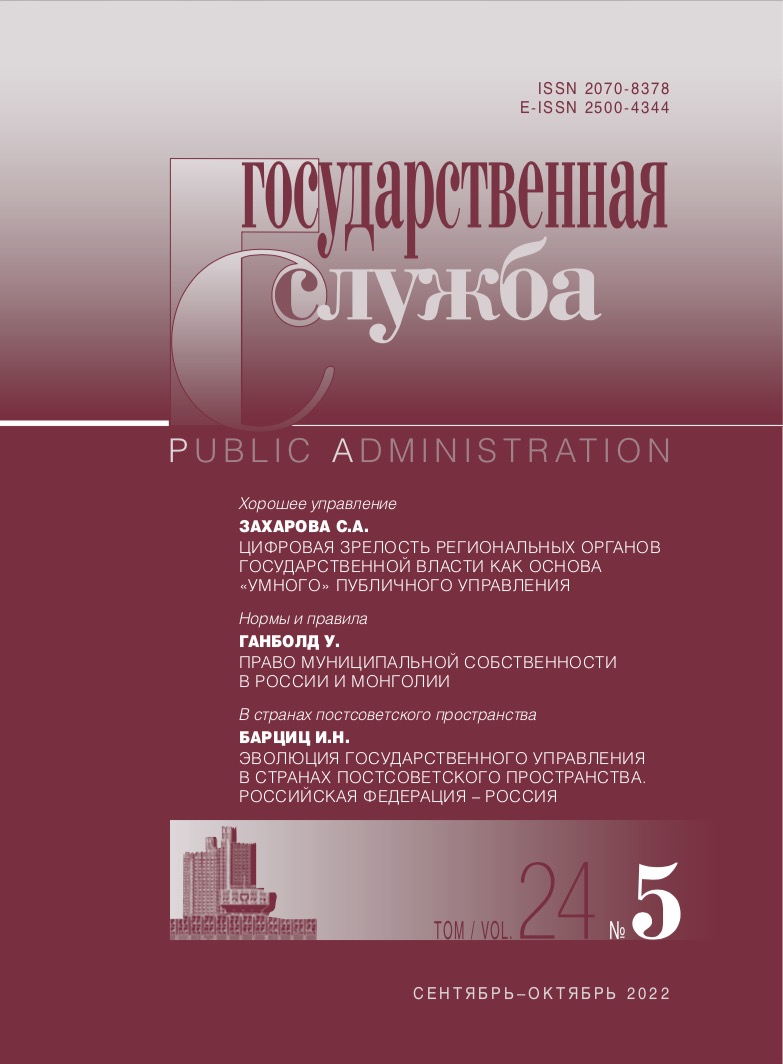Recommended link to article:
IGOR N. BARTSITSа
DOI: 10.22394/2070-8378-2022-24-5-67-118
Abstract:
The article studies the formation of state-building in modern Russia during the period from the destruction of the USSR to the present day. The author emphasizes that the Russian state is one of the oldest in the world with a historically established system of state administration. At the same time, Russian democracy is one of the youngest on the European continent; from this point, it is concluded that reforming process in Russia should be carried out evolutionarily, taking into account domestic and best international experience. The analysis shows that during this period changes have taken place not only in the goals and objectives, as well in the main activities covering various issues of the system of state and municipal administration but also in conceptual approaches to its development. Having studied and applied advanced world experience, the government institutions in the Russian Federation have acquired many features connected to the history of the country and its federal structure. The author studies the history of the formation and stages of changes in the regulatory legal framework, which ensures the operation of the entire system of public administration in Russia. In a formal and legal aspect, the President of the Russian Federation does not belong to any branch of government power but has a significant amount of authority concerning each of them; that is why a specific role in the management process is assigned to him. In the Russian Federation, a system of state and municipal service has been formed, with particular attention paid to training and retraining of professional personnel, combating corruption, and encouraging decent (ethical) behavior of civil servants. It is emphasized that the goals of the administrative reform are aimed to improve the quality and accessibility of public services, to limit government intervention in the economy, to increase the efficiency of the executive authorities; the reform will continue despite the new challenges that the state may face. The conclusion states that in some areas, the reforms have led to essential changes in public administration and an improvement in the quality of life of the population; administrative reform is viewed as an objective need to bring the system of state and municipal administration in line with the constitutionally enshrined principles of the country’s development.
Keywords:
Russian Federation, Russia, Constitution of the Russian Federation, branches of government, public administration, the system of state and municipal service, administrative reform, digitalization, confidence
Received:
November 9, 2020.
References:
Administrative reform in Russia. Ed. by S. E. Naryshkin, T. Ya. Khabrieva. Moscow. Contract: Infra-M. 2006. In Russian
Bartsits I.N. The system of state and municipal management (training course) in 2 Vol. Moscow. Publishing house Delo. RANEPA. 2019. In Russian
Bartsits I.N. Indicators and criteria of efficiency for public administration. Moscow. RAGS. 2010. In Russian
Bartsits I.N., Borshchevsky G.A., Magomedov K.O. Current state and development trends for the state civil service in Russia: analytical report. Moscow. Publishing house Delo. RANEPA. 2018. In Russian
Vishnyakov V.G. Administrative reform in Russia: from the crisis of public administration to an effective state. Zhurnal rossiyskogo prava. 2003. No. 10. P. 11–23. In Russian
Zanko T.A. Constitutional amendments of 2020: impact on the federal executive branch of power. Voprosy gosudarstvennogo i munitsypalnogo upravleniya. 2020. No. 3. P. 7–16. In Russian
The results of 10 years of undergoing the administrative reform and tasks for the future (Materials of a round table held on April 3, 2014, within the framework of the XV April international academic conference «On economic and social development» at the Higher School of Economics). Voprosy gosudarstvennogo i munitsipal’nogo upravleniya. 2014. No. 2. P. 89–109. In Russian
Klimenko A.V. The decade of administrative reform: results and new challenges. Voprosy gosudarstvennogo i munitsipal’nogo upravleniya. 2014. No. 1. P. 8–44. In Russian
Mau V.A. Economic reform: through the prism of constitution and politics. Moscow. 1999. In Russian
Mau V.A. State and economy: experience of economic reforms. Moscow. Delo. RANEPA, 2017. In Russian
Reports on competitive situation in Russia – 2016. Analytical center for the government of the Russian Federation. 2016. In Russian
Okhotsky E.V. Public administration in the context of globalization and restrictions from sanctions. Gosudarstvo i pravo. 2017. No. 5. P. 101–106. In Russian
Russian civil service reform: the history of reform attempts from 1992 to 2000. Ed. and foreword by T.V. Zaitseva. Moscow. Ves’ mir. 2003. In Russian
Tikhomirov Yu.A. Management on the basis of law. Moscow. Formula prava. 2007. In Russian
Bartsits I.N. Efficient bureaucracy – bureaucracy without corruption. Gosudarstvennaya sluzhba. 2016. No. 1 (99). P. 66–71. In English
Pollitt C. Future Trends in European Public Administration and Management: An Outside-In Perspective. 2014. http://www.cocops. eu/wp-content/uploads/2014/04/FutureTrendsInEuropeanPublicAdministrationAndManagement.Pdf.
Articles in Open Access mode are published under the Creative Commons Attribution 4.0 International (CC BY) license.

